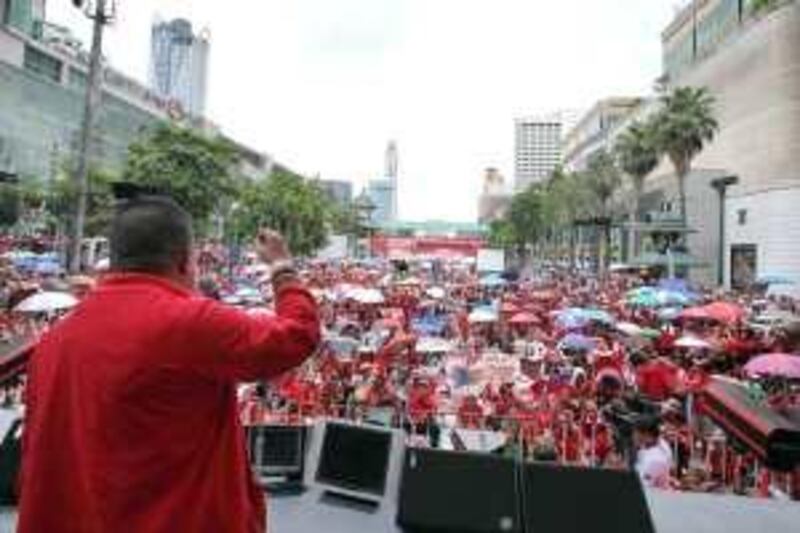BANGKOK // The sign for the luxury Four Seasons hotel hangs over the Rajadamri Road, where thousands of people are walking or riding tuk-tuk motor taxis down the promenade, wearing the red shirts of the opposition protests that have brought Bangkok and its tourism-dependent economy to a standstill.
As pickup trucks bring more red shirts to the city centre, promising more disruption, the Land of Smiles is finding it tough to keep a grin these days. In the upmarket Ratchaprasong shopping area there are stalls and tents where supporters gather and, while some street hawkers are doing good business, the luxury boutiques are firmly closed. Further down the road, travel offices for the Russian carrier Aeroflot are shuttered, as are the offices for the Japan external trade organisation.
Clashes just more than a week ago between protestors of the United Front for Democracy Against Dictatorship, who oppose the government of Abhisit Vejjajiva, and security forces left 24 dead and more than 800 injured in the city's deadliest political violence in 18 years. Thailand, which relies on tourism for 6 per cent of its GDP, is struggling to keep the visitors coming during the demonstrations by the opposition groups, many of whom are supporters of Thaksin Shinawatra, the ousted former prime minister.
Retailers stand to lose billions as shopping malls close their doors and foreign clients at hotels in the Rajprasong area are scared away. These are only estimates as the crisis is not over yet, and the government is only now beginning to count the economic cost. The tourist industry is often the first to bear the brunt of political unrest in Thailand. In December 2008, after the yellow-shirted supporters of the government took to the streets to force the removal of Mr Thaksin's successors, they occupied public buildings and Bangkok's two airports, forcing the cancellation of hundreds of flights.
Korn Chatikavanij, the Thai finance minister, says economic growth could be 2 per cent lower this year because of the disruption caused by the protests and the longer-term effects of the clash between the security forces and demonstrators. "Unless we put an end to this and do it as peacefully as we can in the next few days or next few weeks, I think there will be a significant impact on Thailand's prospects," Mr Korn says. "Growth may be shaved by 1 or 2 percentage points as the unrest may decimate tourist arrivals."
Apichart Sankary, an executive with the federation of Thai tourism associations, says if street protests continue the number of foreign visitors may drop to 14.5 million this year, 1 million fewer than an earlier projection. The occupancy rate at hotels in Bangkok has dropped to 30 per cent from the typical rate of between 80 and 90 per cent during the Songkran New Year festival, from April 13 to 15.
While revellers dousing each other scented water and talcum powder may not have noticed the lower number of visitors to the city, the shop owners certainly have. At the Central Mall on Silom Road, some shops are offering discounts of up to 70 per cent on their wares to try to lure customers in. But the tourists are not buying. And the protests are not healthy for the longer-term outlook for the economy. The rating agency Moody's Investors Service says it is keeping a negative outlook on Thai debt.
A hotel manager at one of the city's top hotels says occupancy rates are drastically down. "What can we do?" he asks. "This looks bad and people are cancelling. We should have up to 70 per cent occupancy, but instead we have 25 per cent." Hotels at the centre of the protests have zero occupancy, the manager adds. One of the countries that Thailand has been hoping to woo for expansion of its tourism industry, China, has cancelled all charter flights to Thailand for the Songkran holiday, which was due to bring in 15,000 people.
Forty-three countries have issued travel advisories to their citizens after the declaration of a state of emergency in Bangkok this month. The UAE is one of seven countries and territories, along with Spain, Latvia, Saudi Arabia, Hong Kong, the Czech Republic and Austria, that have warned their citizens not to travel to Thailand. Foreign direct investment (FDI) will also be hit as investors steer away from an unstable situation.
But Mr Korn is adamant the country's long-term financial stability will not be affected by the current unrest. It is true that Thailand has managed to survive, even thrive, with a fair degree of instability since the military coup that toppled Mr Thaksin in 2006. Much of this stability is because Thailand has substantial foreign exchange reserves and net inflows through its trade surpluses. The stock market plunged 2.1 per cent when it reopened after the Songkran holiday, erasing nearly all the gains it had notched up so far this year.
But it seems like aeons ago that this year's growth forecast was raised to a formidable 5 per cent from a previous estimate of 4 per cent. That was only in March. Getting the tourists back in numbers to Thailand is going to take a lot of effort, even after the red shirts have left Bangkok's shopping areas. business@thenational.ae






